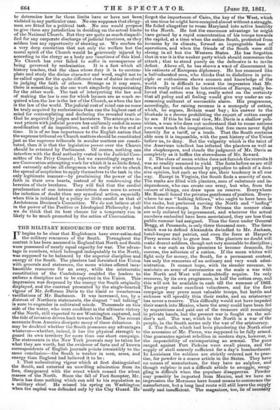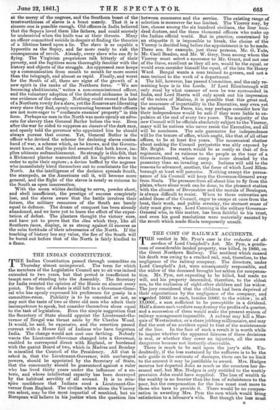THE MILITARY RESOURCES OF THE SOUTH.
IT begins to be clear that Englishmen have over-estimated the military resources of the South. Throughout the contest it has been assumed in England that North and South were possessed of nearly equal capacity for war. The advan- tage in numbers, which belonged indisputably to the North, was supposed to be balanced by the superior discipline and energy of the South. The planters had furnished the Union with generals and statesmen, the mean whites offered inex- haustible resources for an army, while the aristocratic constitution of the Confederacy enabled the leaders to enforce a discipline not to be expected in the Union. This impression was deepened by the energy the South originally displayed, and the contrast presented by the single-hearted vigour of Mr. Jefferson Davis to the timid or treacherous • vacillations of Mr. Buchanan. It was increased, too, by a distrust of Northern statements, the disgust " tall talking" is sure to engender in cultivated minds. Thousands on this side of the water, who were confident in the ultimate victory of the North, still expected to see Washington captured, and the tide of invasion driven back towards the East. The recent accounts from America dissipate many of these delusions. It may be doubted whether the South possesses any advantages whatever—whether, indeed, it has the physical strength to guard its own territory for more than one short campaign. The statements in the New York journals may be taken for what they are worth, but the evidence of facts and of known correspondents of English journals points irresistibly to the same conclusion—the South is weaker in men, arms, and energy than England had believed it to be : 1. That unhesitating -vigour which at first distinguished the South, and extorted an unwilling admiration from its foes, disappeared with the event which roused the silent masses of the North. Since the fall of Fort Sumpter, Mr. Davis has done nothing which can add to his reputation as a military chief. He missed his spring on Washington when the capital was defended only by the Clay Guard. He forgot the importance of Cairo, the key of the West, which at one time he might have occupied almost without a struggle. He failed altogether to rouse Maryland into active hostility to the North. He lost the enormous advantage he might have gained by a rapid concentration of his troops towards the capital, at a time when the entire South, protected from invasion by its climate, formed an impregnable base of operations, and when the friends of the South were still strong in all but the Western States. .He has forgotten that in war it is the weaker party which should commence the attack ; that to stand purely on the defensive is to invite defeat. Above all, he has shown a want of discernment in his estimate of European diplomacy. He has reasoned like a hall-educated man, who thinks that to disbelieve in prin- ciple or enthusiasm shows acumen and knowledge of the world. It is difficult to resist the impression that Mr. Davis really relied on the intervention of Europe,-really be- lieved that cotton was king, really acted on the certainty that all policy and all feeling would give way under an un- reasoning outburst of mercantile alarm. His programme, accordingly, for raising revenue is a monopoly of cotton, which, he argues, Britain must buy ; his answer to the blockade is a decree prohibiting the export of cotton except by sea. If this be his real view, Mr. Davis is a shallow poli- tician, a man who does not understand that to rouse nations you must touch the imagination, that free races never fight heartily for a tariff, or a trade. That the South contains able men it is impossible, with the past history of the Union before use to deny. But the vulgarity which is the taint of the American intellect has infected the planters as well as the shopkeepers, and clouds the judgment of Mr. Davis as completely as it baffles the shrewdness of Mr. Seward. 2. The class of mean whites does not furnish the recruits it was so readily assumed to yield. The facts before us are still few, and too much obscured by prejudice to admit of a deci- sive opinion, but such as they are, their tendency is all one way. Except in Virginia, the South finds a scarcity of men. The ranks are filled with planters, men of substance and in- dependence, who can create one army, but who, from the nature of things, can draw upon no reserve. Everywhere Mr. Russell found the privates gentlemen of position. Every- where lie saw " hulking fellows," who ought to have been in the ranks, but preferred cursing the North and " loafing" about the rum-shops. In New Orleans the meaner class are only enlisted by impressment, and wherever the actual numbers embodied have been ascertained, they are less than public rumour had assigned. Thus the force under General Bragg, at Pensacola, is only three thousand men. The force which was to defend Alexandria dwindled to Mr. Jackson, hotel-keeper and patriot, and even the force at Harper's Ferry seems daily to grow less. The planters no doubt will make decent soldiers, though not very amenable to discipline; but a war such as this promises to become demands, for success, the adhesion of a nation. If the mean whites will fight only for money, the South, for a permanent contest, has only the resources of an ordinary and very weak admi- nistration. It cannot hope, with its slender revenue, to maintain an army of mercenaries on the scale a war with the North and West will undoubtedly require. Its only resource, by its own programme, is half the cotton crop, and this will not be available in cash till the summer of 1862. The gentry make excellent volunteers, and for the first campaign may prove most valuable troops, but battle and sickness will speedily thin their ranks, and an aristocracy has never a reserve. This difficulty would not have impeded their march into Mexico, where the army could have been fed by requisitions and paid out of the treasure still remaining in private hands, but the present war is fought on the sol- dier's soil. The war, which in the North is a war of the people, in the South seems only the war of the aristocracy. 3. The South, which had been plundering the North since the accession of Mr. Pierce, was supposed to be fully armed. One guarantee against rebellion in modern days, however, is the impossibility of extemporizing an arsenal. The guns ranged against Fort Pickens were small pieces, and the supply of shell scarcely sufficient for a day's bombardment. In Louisiana the soldiers are strictly ordered not to prac- tise, for powder is a scarce article in the States. They have no means of manufacture, for they have no sulphur, and though sulphur is not a difficult article to smuggle, smug- gling is difficult when the populace disapproves. Powder may possibly be imported from Mexico, and we have an impression the Mormons have found means to commence the manufacture, but a long land route will still leave the supply costly and insufficient. The magazines, too, lie of necessity at the mercy of the negroes, and the Southern boast of the trustworthiness of slaves is a boast merely. That it is a sincere one is possible enough. Old officers in India believed that the Sepoya loved them like fathers, and could scarcely be undeceived when the knife was at their throats. Many an officer committed suicide in despair at finding the theories of a lifetime based upon a lie. The slave is as capable a hypocrite as the Sepoy, and far more ready to risk the consequences of revolt. Already, every slave who can fly is flying. The Virginian proprietors talk bitterly of their poverty, and the fugitives seem thoroughly familiar with the history and objects of the struggle. An oppressed race keeps up a communication from mouth to mouth far more secret than the telegraph, and almost as rapid. Finally, and worst for the South of all, there are signs of the growth of a new spirit in the ranks of the Northern force. " We are becoming abolitionists," writes a non-commissioned officer, and the voluntary adoption of the detested nickname is but one evidence of the change. Nothing could exceed the hate of a Northern rowdy for a slave, yet the Zouaves are liberating every slave they find, openly murmuring because their officers are not more eager to " confiscate enemies' property" in this form. Perhaps no man in the North was more openly an advo- cate for slavery than General Butler before the war. Even after the war he aided to suppress an emeute of the dark race, and openly told the governor who appointed him he should always pursue that course. Yet, General Butler is the officer who devised the scheme for declaring slaves contra- band of war, a scheme which, as he knows, and the Govern- ment know, and the people feel assured that both know, im- plies ultimate enfranchisement. So strongly is this felt, that a Richmond planter manumitted all his fugitive slaves in order to spite their captors ; a device baffled by the negroes who immediately hired, themselves out to combatants for the North. As the intelligence of the decision spreads South, the stampede, as the Americans call it, will become more general, and the flight of the slaves is nearly as ruinous to the South as open insurrection. With the mean whites declining to serve, powder short, and shell insufficient, the prestige of success completely lost, and the slaves aware that the battle involves their future, the military resources of the South are barely equal to defence. The dream of conquest has been already abandoned, and we have yet to learn the effect of the expec- tation of defeat. The planters thought the victory sure, and have yet to prove that the elan which they, like all Southern races, display, is as strong against ill success as the calm fortitude of their adversaries of the North. If the teaching of history has any value, the fire of the South will be burnt out before that of the North is fairly kindled to a flame.































 Previous page
Previous page